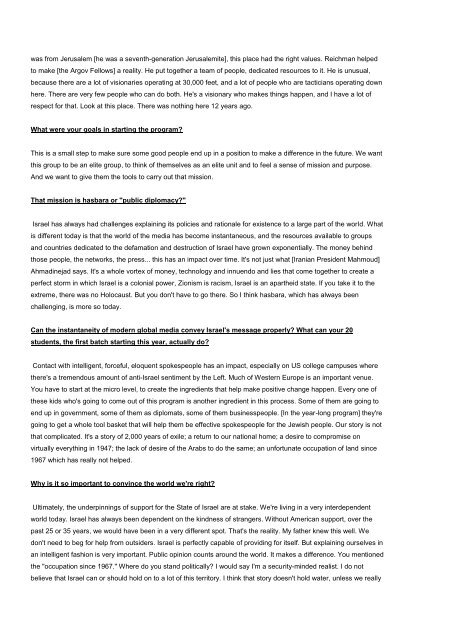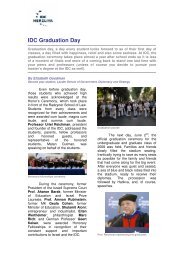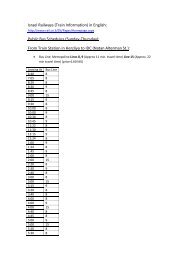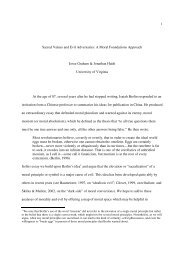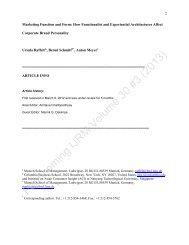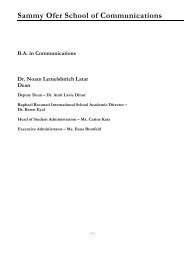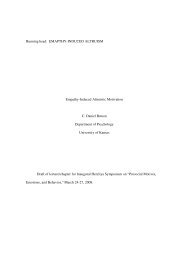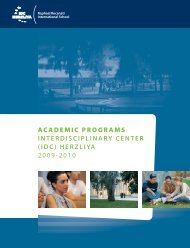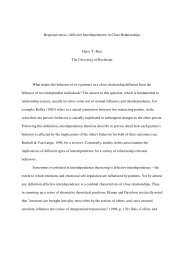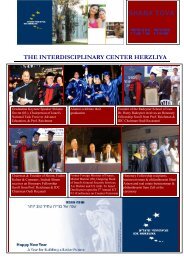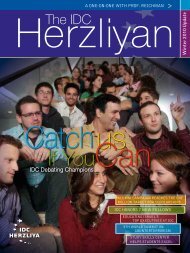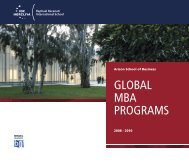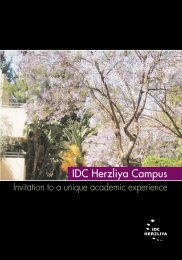Diplomacy: Memorializing Shlomo Argov
Diplomacy: Memorializing Shlomo Argov
Diplomacy: Memorializing Shlomo Argov
Create successful ePaper yourself
Turn your PDF publications into a flip-book with our unique Google optimized e-Paper software.
was from Jerusalem [he was a seventh-generation Jerusalemite], this place had the right values. Reichman helped<br />
to make [the <strong>Argov</strong> Fellows] a reality. He put together a team of people, dedicated resources to it. He is unusual,<br />
because there are a lot of visionaries operating at 30,000 feet, and a lot of people who are tacticians operating down<br />
here. There are very few people who can do both. He's a visionary who makes things happen, and I have a lot of<br />
respect for that. Look at this place. There was nothing here 12 years ago.<br />
What were your goals in starting the program?<br />
This is a small step to make sure some good people end up in a position to make a difference in the future. We want<br />
this group to be an elite group, to think of themselves as an elite unit and to feel a sense of mission and purpose.<br />
And we want to give them the tools to carry out that mission.<br />
That mission is hasbara or "public diplomacy?"<br />
Israel has always had challenges explaining its policies and rationale for existence to a large part of the world. What<br />
is different today is that the world of the media has become instantaneous, and the resources available to groups<br />
and countries dedicated to the defamation and destruction of Israel have grown exponentially. The money behind<br />
those people, the networks, the press... this has an impact over time. It's not just what [Iranian President Mahmoud]<br />
Ahmadinejad says. It's a whole vortex of money, technology and innuendo and lies that come together to create a<br />
perfect storm in which Israel is a colonial power, Zionism is racism, Israel is an apartheid state. If you take it to the<br />
extreme, there was no Holocaust. But you don't have to go there. So I think hasbara, which has always been<br />
challenging, is more so today.<br />
Can the instantaneity of modern global media convey Israel's message properly? What can your 20<br />
students, the first batch starting this year, actually do?<br />
Contact with intelligent, forceful, eloquent spokespeople has an impact, especially on US college campuses where<br />
there's a tremendous amount of anti-Israel sentiment by the Left. Much of Western Europe is an important venue.<br />
You have to start at the micro level, to create the ingredients that help make positive change happen. Every one of<br />
these kids who's going to come out of this program is another ingredient in this process. Some of them are going to<br />
end up in government, some of them as diplomats, some of them businesspeople. [In the year-long program] they're<br />
going to get a whole tool basket that will help them be effective spokespeople for the Jewish people. Our story is not<br />
that complicated. It's a story of 2,000 years of exile; a return to our national home; a desire to compromise on<br />
virtually everything in 1947; the lack of desire of the Arabs to do the same; an unfortunate occupation of land since<br />
1967 which has really not helped.<br />
Why is it so important to convince the world we're right?<br />
Ultimately, the underpinnings of support for the State of Israel are at stake. We're living in a very interdependent<br />
world today. Israel has always been dependent on the kindness of strangers. Without American support, over the<br />
past 25 or 35 years, we would have been in a very different spot. That's the reality. My father knew this well. We<br />
don't need to beg for help from outsiders. Israel is perfectly capable of providing for itself. But explaining ourselves in<br />
an intelligent fashion is very important. Public opinion counts around the world. It makes a difference. You mentioned<br />
the "occupation since 1967." Where do you stand politically? I would say I'm a security-minded realist. I do not<br />
believe that Israel can or should hold on to a lot of this territory. I think that story doesn't hold water, unless we really


